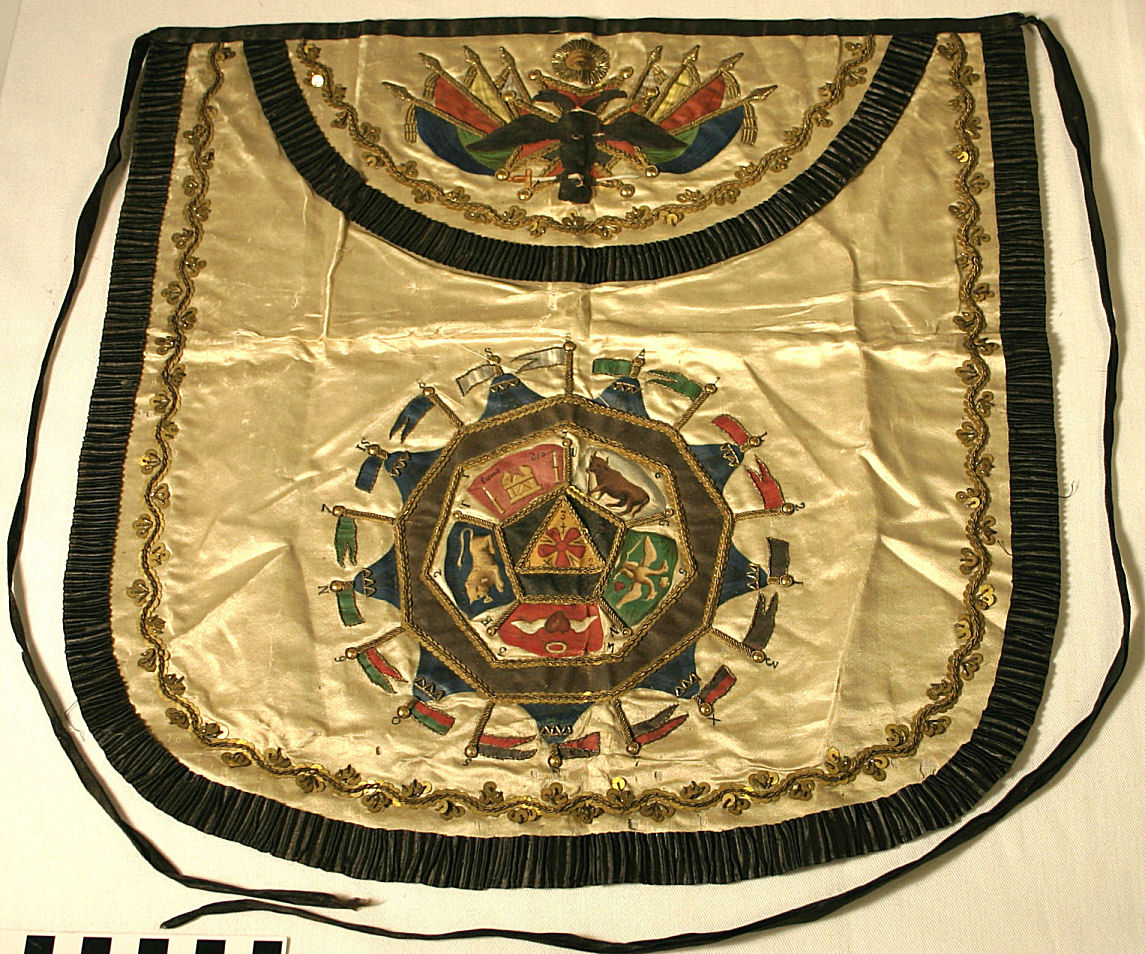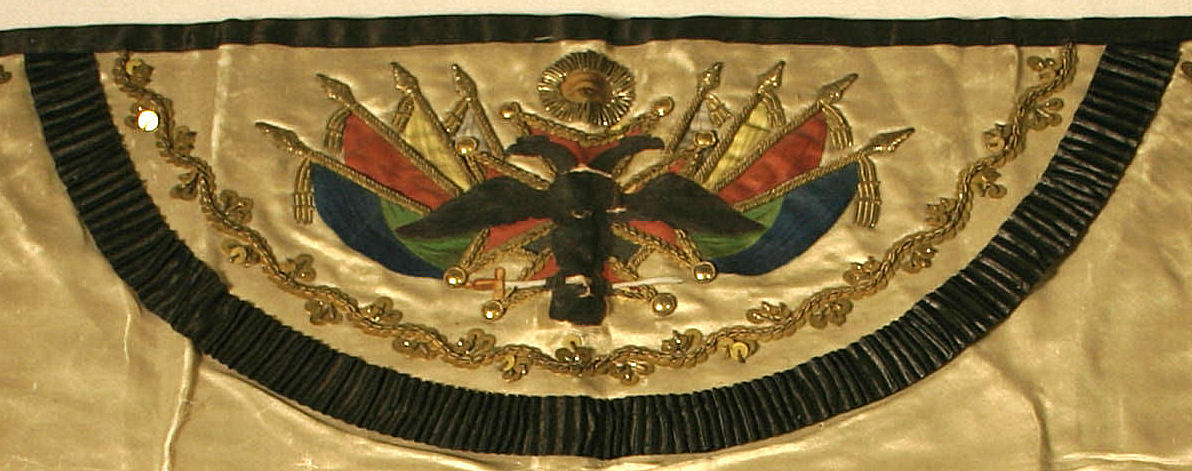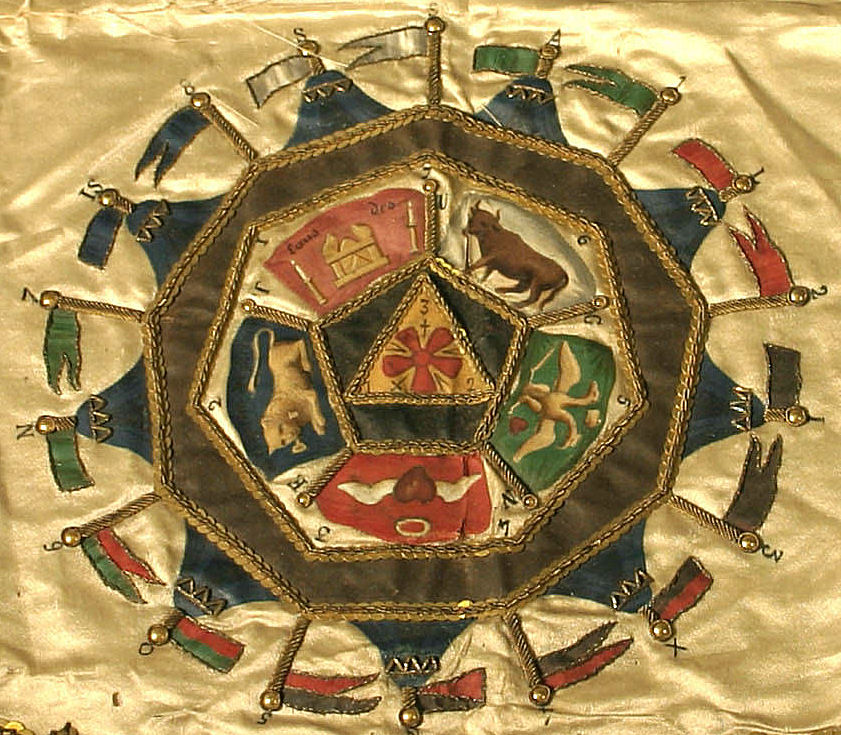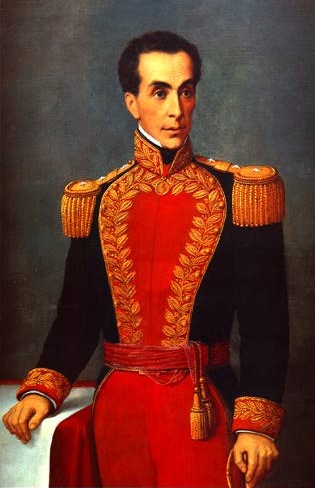Scottish
Rite 32nd Degree Apron of Simon Bolivar

Photographer:
Catherine M. Walter; Image, Data and Research:
Courtesy
of the Chancellor Robert R Livingston Masonic Library of Grand Lodge, New York

Photographer:
Catherine M. Walter; Image, Data and Research:
Courtesy
of the Chancellor Robert R Livingston Masonic Library of Grand Lodge, New York

Photographer:
Catherine M. Walter; Image, Data and Research:
Courtesy
of the Chancellor Robert R Livingston Masonic Library of Grand Lodge, New York
This is Simon Bolivar's cream silk
32nd degree apron depicting the camp of the 12 tribes of Israel. Simon
Bolivar was the hero of over 200 battles liberating South America from Spain,
freeing Venezuela, Colombia, Ecuador, Peru and Bolivia. He founded and
served as Master of Protectora de las Vertudes Lodge No. 1 in Venezuela; founded
the Lodge Order and Liberty No. 2 in Peru. He received his Scottish Rite
degrees in Paris in 1807 and also became a Knight of the Knights Templar in
France in 1807.
SIMON
BOLIVAR
by
Elmer E. Rogers, 33rd Degree
THE NEW AGE - SEPTEMBER 1948

The minds of liberty-conscious souls of North and South America
turned to the beautiful little city, Bolivar, Missouri, on July 5,
1948. There the imposing 7-foot bronze figure of Simon Bolivar,
South America's Liberator and a Mason, standing on a marble base 11
feet high, the gift of Venezuela, was unveiled. There the life, the
character and achievements of the George Washington of six
countries of South America were fittingly commemorated in the
speeches of President Harry S. Truman, President Romulo Gall egos
of Venezuela, and the Governor of Missouri, Philip M. Donnelly, and
by the presence of Sr. Gonzalo Carnevali, Venezuelan Ambassador,
other notables and thousands of plain American citizens.
"Bolivar's life presents one of history's most colorful personal
canvases of adventure and tragedy, glory and defeat," said Wallace
Thompson.
We here present but a brief sketch of his life's picture, and
express the hope that our readers may not only seek to learn of the
200 battles he fought as he moved his troops over an untracked
wilderness under an equatorial sun, and in the severe weather atop
the Andes, of the nations he freed from the yoke of Spanish
oppression, but that they will study his life's work and his
writings to learn of his motives, his ideals of liberty in all its
phases, his achievements, and his concepts of statecraft. For th e
six republics - Venezuela, Colombia, Panama, Ecuador, Peru and
Bolivia - and the foundation laid for Pan American relations for
the Western Hemisphere are monuments to his military skill and
statesman-like vision.
Born to the nobility and to wealth in Caracas, July 24, 1783, Simon
Bolivar forsook the luxurious life of material things and the
social position for the nobility of the spirit, and he died in
abject poverty.
The Liberator's father was Juan Vincente Bolivar y Ponte, and his
mother was Maria de la Concepcion Palacios y Blanco. Both of his
parents were of noble families and both died before he was fifteen
years of age.
After acquiring a liberal education at home, largely from private
tutors, Simon was sent to Europe at the age of seventeen under the
guidance of his favorite tutor, Simon Rodriguez, a noted
philosopher who was received among the scholars of Europe as such
and who was suspected of "radical leanings" as he was in sympathy
with the teachings of the great French philosophers of the 18th
century which were held in abhorrence by the overly nice people of
Spain, France, Italy and the ruling class of his native lan d - the
exploiting class.
With an income of $20,000 a year - a large income for that period -
and the husband, at the age of eighteen, of a rich wornan who had
attained her sixteenth year, social attentions were showered on
young Bolivar by the courts of Europe, the great and the near
great, much of which he regarded with superciliousness.
His wife died of yellow fever in less than a year after her
marriage, and Bolivar a few years later returned to Europe to study
conditions there. While in Madrid, he was presented to His Majesty
the King and Her Majesty the Queen, with a condescension which his
keen sense of such relations perceived as empty social etiquette
extended to a rich, young Colonia of noble blood. As was due one of
his social standing, Bolivar was received in audience by the Pope.
But one age-old custom at the Holy See, always exp ected of
visitors at such audiences, is that of kissing the Pope's foot.
This Bolivar refused to do, "looking the other way." Asked by the
Spanish Ambassador, who had taken him to the Vatican, why he had
not conformed to the custom, he curtly replied that his respect for
the high office of the Pontiff should not be measured by an act of
servility.
Like Thomas Jefferson, who had visited Europe, Bolivar saw much and
reflected much on the causes of the despair, squalor and
degradation of the masses in Rome and the larger cities of France,
Italy and Spain, where Romanism so largely prevailed. Having
observed the same conditions in his own country, he, a few mornings
after his audience with the Pope, climbed to the top of Mount
Aventin with his faithful Rodriguez. There, while meditating amidst
the ruins caused by the defiance of the power of aristocracy by the
people, Bolivar suddenly saw a great light and, throwing his hands
heavenward, is said to have taken a vow to devote his life to
freeing his own land from the oppressive power of Spain.
Bolivar had spent much time in Paris and there became a Mason in
the York Rite and received the Scottish Rite Degrees as far as the
30th Degree.
Returning to Venezuela by the way of the United States of America,
where he visited many celebrities in the eastern cities, he
returned to Caracas at the end of 1809, at the age of twenty-six.
He soon offered his services to the junta of which he was a member
and which, on April 19, 1810, had revolted against the crown of
Joseph Bonaparte, King of Spain, in favor of Ferdinand VII, son of
Charles IV, who had been deposed by the French Government, and they
forced the Viceroy to abdicate. Thus Venezuela was th e first
Colony of Spain to declare its independence, an event which took
place July 5, 1811.
The spirit of revolt having been participated in early by General
Miranda, a Mason, who had served under George Washington in the War
for Independence, Bolivar was sent by the junta to England to call
him back from exile to the colors of the Revolutionaries. He
returned and headed the revolutionary forces with Bolivar as one of
his generals. Defeated by the Spanish forces, Bolivar became a
refugee on the Island of Curacao. But, by September, 1812, he was
in Cartagena, where he scored a victory against the S panish in New
Granada (now Colombia). Then, at the head of some 500 men, he
marched over the Andes to Venezuela and, joined by many recruits en
route there, he defeated a large Spanish force and, though he
entered Caracas triumphantly on August 4, 1813, he was defeated a
year later. Returning to New Granada, he won a victory at Bogota.
But, failing at Santa Marta, he resigned his commission and went to
Jamaica and then to Haiti. From there, with the aid of President
Peton, he organized a small force and sailed for Venezuela in
March, 1816, where for three years his fortunes of war varied
between defeat and victory. Offering to resign at the end of three
years, he was prevailed upon to continue the war. This was in 1819.
Having reorganized the army, Bolivar for the third time crossed the
Cordilleras of the Andes to New Granada. There he joined the forces
of General Santander, a Mason and a Republican leader, and, in
August, won the pivotal battle of Boyaca. Four months later
Venezuela united with New Granada and formed the new Republic of
Colombia and, following the victory at Bambona, Ecuador was
included as a part of the new republic. With the victory over the
Spaniards at Carabobo, June 25, 1821, Spain lost control of this
area.
The Spanish power was not yet cleared from that vast region of
upper and lower Peru (now Peru and Bolivia) which extended from the
boundaries of Chile and Argentina to Ecuador. General Jose de San
Martin, a Mason, and General Bernardo O'Higgins, also a Mason, had
freed Argentina and Chile of the Spanish power, and the former, now
"Protector" of Peru, arrived at Guayaquil on July 26, - 1822, where
he conferred with Bolivar. What procedures were decided upon, with
respect to Peru, at that conference between t hese two great
Spanish Liberators, both of whom were Masons, will probably never
be known. San Martin resigned his "Protectorship" of Peru and
returned to Argentina. At any rate Bolivar took over and, arriving
at Callao, September 1, 1823, he was invested with the title of
"Liberator" of Peru. He trained some 4,000 Peruvians and, with the
army that had come to Peru with him, he had some 9,000 men. With
these he engaged an equal number of Spaniards at Junin in a bloody
cavalry battle with sabers, where not a shot was fired, and won a
victory which, with the one at Ayacucho on December 9, 1824, under
General Antonio Jose de Sucre, forever ended the Colonial power of
Spain in the New World.
Having planned these battles with General Sucre, a Mason, Bolivar
went to Lima to organize a civic government and to call a
constitutional convention. When, on February 8, 1825, he had
effected the new government, he resigned the supreme power in
Colombia and Peru. Declining a gift of 1,000,000 pesos (about
$200,000) from Peru and having attended to some civic matters in
upper Peru (Bolivia), Bolivar left General Sucre in charge and
headed for Bogota, Colombia, to quiet civil strife which had arisen
between his former comrades. Arriving there in November, 1826, he
soon went on to Venezuela, calling a constitutional convention en
route to meet at Valencia, January, 15, 1827. Though he had not
been able to adjust the disaffection, he entered Caracas in
triumph. Finally, after fourteen years in supreme command,
Bolivar's resignation was accepted by the Congress at his request,
in the face of the intrigue and abuse of his enemies who were
hungry for power. Returning to Bogota in September, 1828, he called
a gener al convention but, despite his appeals, most of his old
friends withdrew, leaving no quorum. In September, he escaped
assassination in Bogota. Trouble broke out in Peru, which, with the
help of Sucre, was quieted in 1829. Trouble resumed in Venezuela
and Colombia and, though he was recovering from a critical illness
at Guayaquil, he returned to Bogota. His convention having failed
of organization, the disaffection between his old followers not
having been settled, and being in ill health, he finally again r
esigned the supreme power, April 27, 1830, which he had taken
temporarily, and left Bogota, feted and honored as he went frorn
place to place on his way to Cartagena. There he learned of the
murder of his most trusted and efficient General Sucre, on June
4th, the effect of which, together with his advanced state of
tuberculosis, caused his death on December 17, 1830, at the age of
forty-seven, at a country place a few miles from Santa Marta,
Colombia, where he issued his last proclamation.
Intrepid, hopeful, farsighted, indomitable, and profound in his
thinking for the welfare of mankind, Bolivar proclaimed, to those
who had the vision to see, the following Masonic principles as his
life ebbed to the shores beyond:
"All of you must work for the inestimable good of the Union; the
people obeying the government in order to avoid anarchy; the
ministers praying to heaven for guidance; and the military using
its sword in defense of social guaranties. . . . If my death
contributes to the end of partisanship and the consolidation of the
Union, I shall be lowered in peace into my grave."

